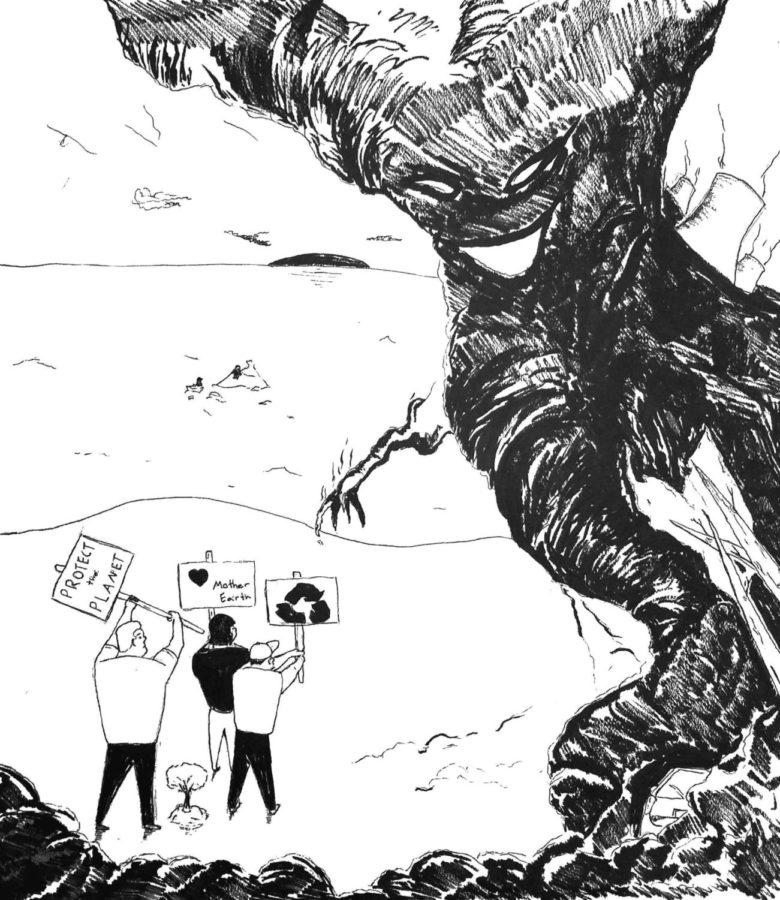It’s been cold recently. Really cold. With a low of -21 degrees Fahrenheit on Wednesday, Chicago was briefly colder than Antarctica and, factoring in windchill, nearly 100 degrees colder than Los Angeles. Part of me certainly regrets my naive high school adamance about not going to California for college. But another part of me is deeply concerned.
Yes, this cold polar vortex makes for a fun story and a much-needed day off (No class! Hot chocolate! More time to make up all the school work I’m behind on!), but these extreme, record-breaking weather patterns are only becoming more commonplace, and more destructive. In the past couple days, at least eight deaths have been linked to the bitter cold in the American Midwest. The so-called “bomb cyclone” that hit parts of the eastern United States early last year left nearly 2 million households without power. The devastating Hurricane Michael, which swept portions of Mexico and the American Southeast in mid-October, resulted in dozens of deaths, over a thousand missing persons at one point, and potentially over $4.5 billion in total damages. While President Donald Trump was dismissive of climate change last year—calling it a hoax “created by and for the Chinese”—it remains the single most significant and plausible explanation for the extraordinary intensity of these weather phenomena.
Climate change has been a popular topic of choice among Viewpoints columnists in the past couple months. In mid-December, columnist Maya Holt published “Beyond the Shorter Shower: Individual Environmentalism Just Isn’t Enough” and, true to her word, calls eloquently for not just individual environmental consciousness, which she admits is insufficient, but also large-scale organization to combat climate change. Earlier this month, columnist Ruby Rorty urged students at UChicago to be more environmentally-conscious. Climate change is “the greatest threat facing our society,” she says, and students need to take tangible action, whether it’s by using reusable water bottles or making connections to climate change in our class discussions.
While these calls to action are certainly important, simply reducing our global carbon footprint isn’t enough. Educating climate skeptics, campaigning for environmentalist candidates, or even divesting from fossil fuels are certainly important and necessary steps. But policies aimed simply at limiting or even eliminating carbon emissions are too little, too late.
Even if we were able to reduce global carbon emissions to zero starting tomorrow, global temperatures would continue to rise and polar caps would continue to melt. There is a significant delay between the amount of heat energy the Earth has already absorbed and the actual air-temperature, a delay caused by the heat-sink properties of the world’s oceans. Earth’s temperature is already 1 degree Celsius over the pre-industrial average, and scientific models have shown that it is set to rise another 0.6 degrees even if no further greenhouse gases are released. The 2018 Intergovernmental Panel on Climate Change (IPCC) report on global warming and the Paris climate agreement both warn of irreparable damage if Earth’s temperature rises just 1.5 degrees Celsius over the pre-industrial levels, so this reality is alarming.
The widely-circulated IPCC report also notes that even if we are able to limit warming to 1.5 degrees, sea levels are still set to rise up to 0.77 meters by 2100. While it is unclear what the temperature threshold is for a complete disappearance of the polar ice caps, the IPCC report has medium confidence (about 50 percent probability) that “[M]arine ice sheet instability in Antarctica and/or irreversible loss of the Greenland ice sheet…could be triggered at around 1.5 degrees Celsius to 2 degrees Celsius of global warming.” If the polar ice caps do melt entirely, there would be a cascade of serious environmental effects including catastrophic sea level rise and drastically altered global weather patterns.
This is just part of the evidence that we are in dire straits. In addition to aggressive curbing of carbon emissions, we must also begin to formulate policies and develop technologies to deal with those effects, some of which are now inevitable regardless of how many petitions we sign, how many electric cars we buy, and how many countries switch entirely to renewable energy sources. Carbon capture techniques need to be developed if we are to meet desired warming limits. Cities and nations with low-lying coastlines must begin to prepare for a likely inevitable and staggering rise in sea level.
So yes, use reusable bottles, put pressure on the administration to divest from fossil fuels, and continue to push for a cultural shift toward environmentalism. All of that will help. But also know that it might not be enough. Solving these other issues—continued warming despite elimination of carbon emissions, sea level rise—will require implementation of policies and development of technologies that do not yet exist, things beyond the abilities of most college students. Perhaps all we can do now is find some way to get involved and, for those who want to, prepare for careers in fields that will have a larger impact in finding solutions. These next 10 years will be crucial in determining whether our planet can indeed be saved. We have our work cut out for us.
Lucas Du is a second-year in the College.









